1. Introduction to Digital Marketing
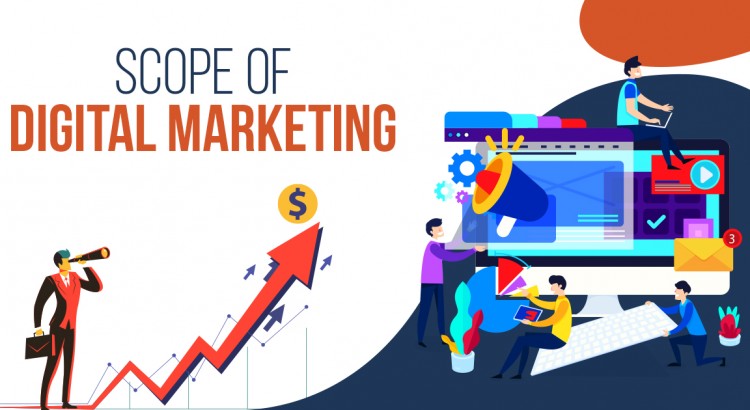
Digital marketing refers to the use of digital channels, platforms, and technologies to promote products, services, or brands. Unlike traditional marketing, which relied heavily on offline strategies like print, television, or radio advertisements, digital marketing leverages the internet, mobile apps, social media, search engines, and other online platforms to reach and engage audiences.
With the increasing number of businesses using digital strategies, the scope of digital marketing continues to expand. It is crucial for small startups to global corporations to connect with their target audiences in real-time, build brand awareness, and drive sales.
2. The Evolution of Digital Marketing
The reasons for this shift from traditional marketing to digital marketing are multifaceted:

- Internet Penetration: The rapid growth of the internet users globally has provided businesses with a larger audience that they can target effectively.
- Mobile Usage: The increased adoption of smartphones makes digital marketing more accessible and effective. Mobile applications, websites, and social media have become main sources of information and shopping for consumers.
Consumer Behaviour: Consumers will be more apt to search, compare prices and read reviews for products online, then buy and, therefore digital marketing is crucial to the customers’ journey today.
3. Primary Channels of Digital Marketing
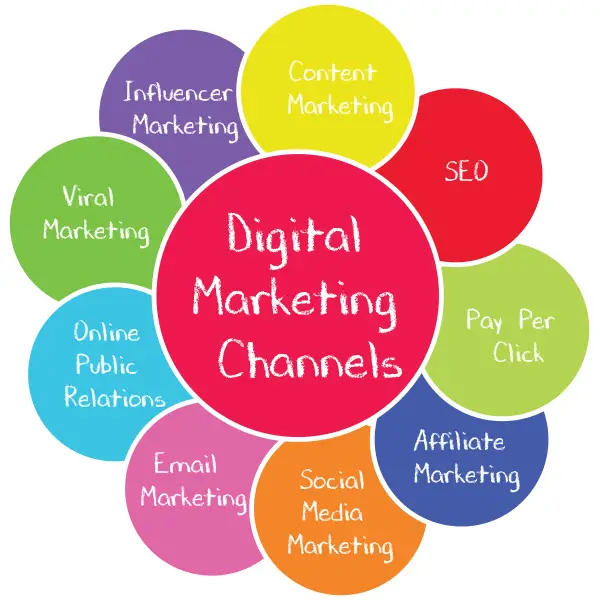
There are several channels through which business interacts with and engages its audiences. Each one has its pros and caters to a part of the strategy of marketing differently.
3.1 Search Engine Optimization (SEO)
SEO is the process of optimizing a website to rank higher in SERPs for specific keywords. The more visibility, organic traffic, and potential customers come from a higher ranking. SEO encompasses on-page optimization (content, keywords, meta tags) and off-page optimization (backlinks, social signals).
3.2 Social Media Marketing (SMM)
Social media marketing focuses on leveraging platforms like Facebook, Instagram, Twitter, LinkedIn, and TikTok to engage with audiences, build brand awareness, and drive traffic to websites. Social media marketing includes paid advertisements, organic posts, influencer marketing, and community management.
3.3 Content Marketing Scope of Digital Marketing
It includes producing relevant, valuable, and consistent content to attract as well as retain a target audience. These can be through sources such as blog articles, articles, videos, podcasts, infographics, and eBooks that ideally answer questions or entertain the audience.
3.4 Email Marketing
Email marketing is one of the oldest and the most effective channels in digital marketing. It deals with sending focused emails to both prospects and customers for relationship-building, lead nurturing, and driving conversions. Emails can be targeted and automated with a campaign; therefore, this strategy is cheaper.
3.5 Pay-Per-Click Advertising (PPC)
PPC is a form of online advertising where businesses pay a fee each time their ad is clicked. Google Ads is one of the most popular PPC platforms. Ads appear on search engines, social media, and websites, allowing businesses to target specific keywords and demographics.
3.6 Affiliate Marketing
Affiliate marketing refers to the promotion of your product or service through an affiliate for a commission. It is performance-based, where companies can collaborate with external parties without having to incur upfront costs in order to sell more products.
3.7 Influencer Marketing
Influencer marketing is the process of collaborating with people who have a significant online following to promote products and services. This can help businesses reach highly engaged audiences and build credibility, especially in niches like fashion, fitness, and technology.
3.8 Online Public Relations (PR)
Digital PR encompasses the management of a brand’s online reputation, engaging with online media, and obtaining positive press coverage on digital platforms. It also encompasses responding to customer reviews and feedback on social media, which is important for a good brand image.
3.9 Video Marketing
Video marketing is one of the most effective ways to communicate with an audience. Platforms such as YouTube, TikTok, and Instagram Reels permit businesses to create engaging videos in order to showcase a product, share testimonials from customers, conduct tutorials, or share brand stories.
3.10 Mobile Marketing
With mobile devices taking the market, mobile marketing targets customers using mobile apps, SMS, push notifications, and sites easily accessible via mobile devices. Digital marketing provides businesses with the opportunity to connect with customers with customized offers and promotions at their fingertips.
4. Advantages of Digital Marketing

4.1 International Reach
Digital marketing is among the advantages the companies enjoy: it can reach the whole market and a global audience. Businesses no longer limit their marketing activities to their local markets or physical locations because of digital marketing channels which allow them to interact with worldwide customers.
4.2 Cost-Effectiveness
It is usually cheaper than traditional marketing. For instance, with digital advertising, email campaigns, and social media management at relatively lower costs, a company can reach out to a much wider audience without having to break the bank.
4.3 Measurable Results
Unlike traditional marketing, whose success of the campaigns is hard to measure, digital marketing gives real-time data and analytics. Marketers can track engagement metrics, website traffic, conversion rates, among other key performance indicators, to evaluate the effectiveness of efforts.
4.4 Personalization
Digital marketing enables businesses to create highly customized experiences for customers. With the help of data analytics and customer segmentation, businesses can send messages, offers, and content that are targeted towards specific audience groups, thereby increasing the chances of conversion.
4.5 Real-Time Interaction
Digital marketing allows businesses to interact with customers in real-time. Using social media, chatbots, and instant messaging, businesses can respond to inquiries, address concerns, and provide immediate support to customers, which enhances customer satisfaction and loyalty.
5. Digital Marketing Scope Across All Industries

5.1 E-commerce Industry
Digital marketing has made the e-commerce industry explode into growth. With SEO, social media, and paid ads, online retailers capture customers. Then, there are email marketing and personalized recommendations for sales. In fact, all aspects of an online shopping experience, from discovery to post-purchase engagement, are centered on digital marketing.
5.2 Healthcare Industry
Digital marketing in healthcare is rapidly changing. Healthcare providers, hospitals, and pharmaceutical companies use SEO, content marketing, social media, and paid advertising to educate and engage patients. Telemedicine services, patient reviews, and online consultations are also integral to the healthcare sector’s digital marketing strategy.
5.3 Education Industry
Digital marketing is used by educational institutions and online course providers to reach out to potential students and promote courses. SEO, social media campaigns, webinars, and content marketing help the educational institutions establish brand authority and attract new students.
5.4 Hospitality Industry
The hospitality industry has taken up digital marketing very seriously. Online travel agencies (OTAs), social media, email marketing, and paid search ads are used to market hotels, resorts, and travel packages. Reviews and testimonials on TripAdvisor and Google Reviews are significant in making a customer’s decision.
5.5 Real Estate Industry
Today, property agents and organizations are resorting to online marketing strategies in creating leads, properties, and business relationships between prospective buyers and themselves. Sites, social media, email, and virtual tours changed the concept of marketing real estates.
6. Difficulties of Digital Marketing Scope of Digital Marketing
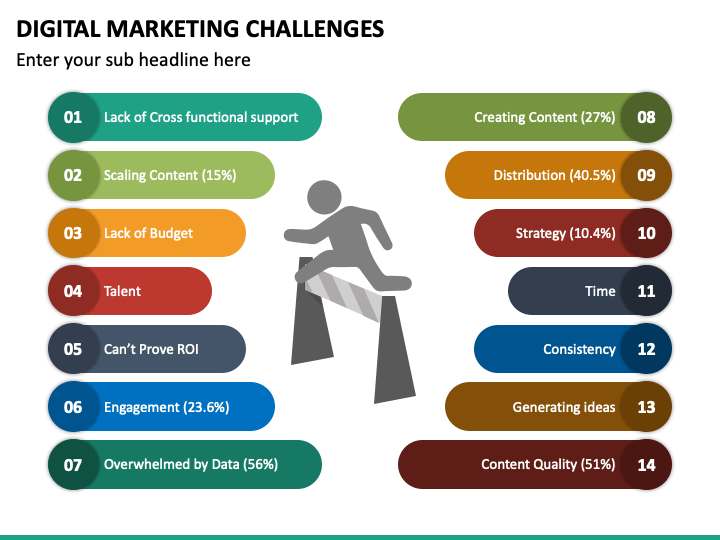
Despite the expansive scope, it has its set of problems, too:
- Algorithm Updates: Google and Facebook frequently change their algorithms. This can make the ads or content less visible.
- Ad Saturation: Users can be bombarded with too much online advertising, leading to ad blindness or disengagement.
- Privacy: With more concern over data privacy, companies have to be compliant with the regulations like GDPR in order to protect customer information.
- Competition Overload: Because of the wide adoption of digital marketing by organizations, competition is becoming saturated; it has been difficult to have a niche stand out.
7. Future Trends in Digital Marketing

7.1 AI and Automation
AI and automation tools are rapidly gaining prominence in digital marketing. AI-based chatbots, predictive analytics, and personalized content recommendation are revolutionizing the way business organizations interact with customers.
7.2 Voice Search Optimization
More frequently, voice assistants such as Siri, Alexa, and Google Assistant are becoming standard. Voice search is changing how people search and find information and businesses need to adapt their SEO strategies.
7.3 Augmented Reality (AR) and Virtual Reality (VR)
AR and VR technologies provide new opportunities for business to create experiences for customers in an immersive manner. For instance, AR would enable customers to see how the product would look in their home, while VR would allow a virtual tour of a property or destination.
7.4 Video Content Dominance
Video marketing continues to dominate digital marketing strategies. Short-form videos, live streaming, and interactive video content will be key trends in the coming years as businesses leverage platforms like TikTok,
8. Skills Required for Digital Marketing
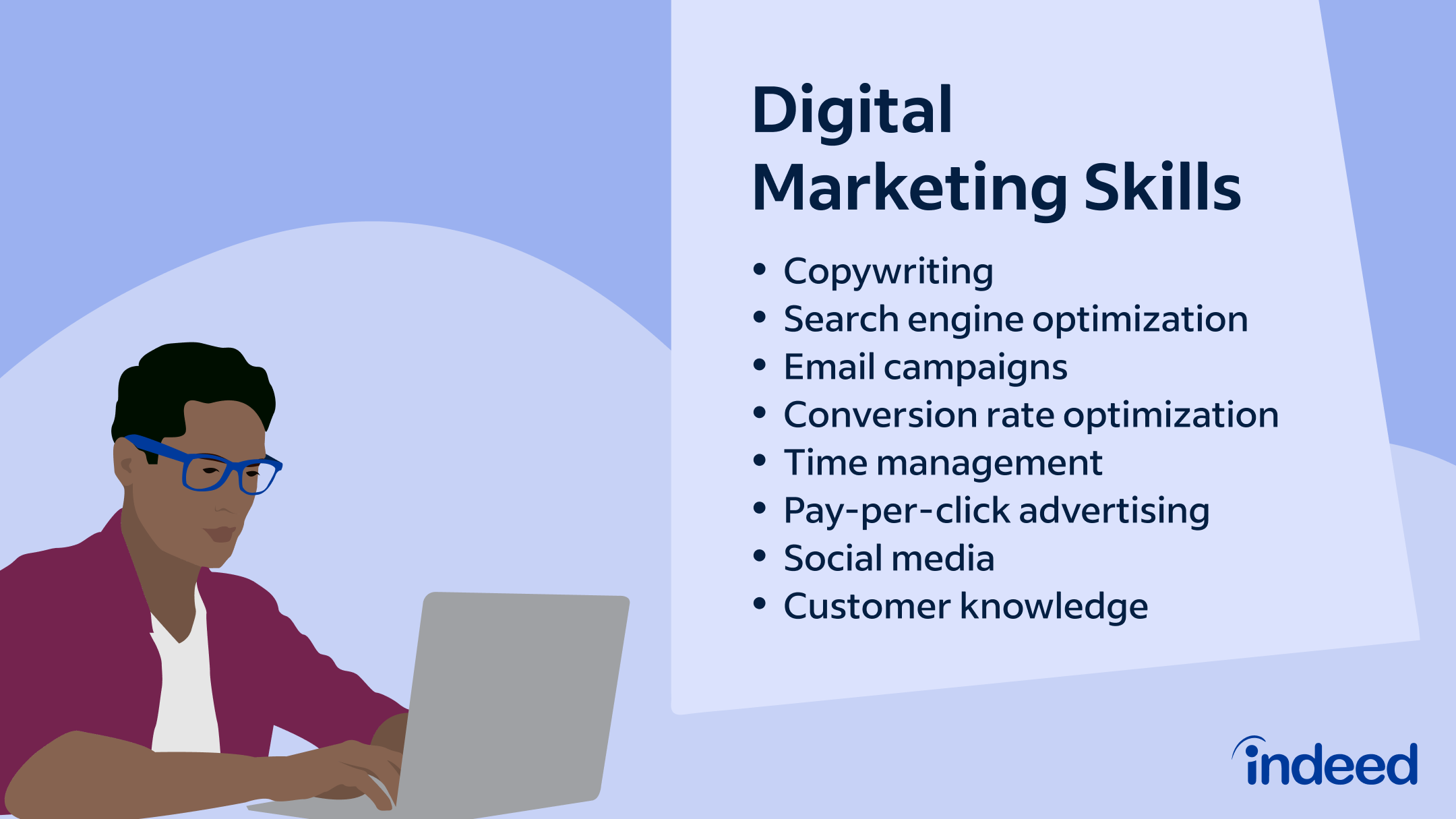
As the scope of digital marketing is expanding, the demand for skilled professionals in this field has surged. To succeed in digital marketing, one needs to possess a diverse set of skills. Here are some of the most important skills for digital marketers:
8.1 Analytical Skills
Digital marketing is based on data; therefore, solid analytical skills must be possessed for data interpretation to make decisions based on it. A digital marketer must know website traffic, conversion rates, CTR, and customer engagement in order to adjust the campaign appropriately.
8.2 Content Creation and Writing Skills
Content is the backbone of digital marketing. The marketer needs to be able to create engaging, high-quality content that resonates with the target audience. Be it writing a blog post, creating a video, or infographics, this is an important skill in this field.
8.3 Technical Skills
The knowledge of simple web development, HTML, and CSS in digital marketing can be useful. A digital marketer needs to know the variety of digital tools, such as Google Analytics, Google Ads, and social media advertising platforms, in order to manage campaigns effectively.
8.4 SEO and SEM Know How
Search Engine Optimization (SEO) and Search Engine Marketing (SEM) are important factors for the increase of visibility in search engines. A digital marketer should be skilled in SEO methods such as keyword research, link building, and content optimization to generate organic traffic. SEM, which is a paid form of advertising through Google Ads, also has a lot to do with traffic generation to websites.
8.5 Social Media Expertise Scope of Digital Marketing
Considering the role played by social media in the area of digital marketing, familiarity with social media management will be important. Digital marketers must be aware of making campaigns, interacting with followers, and analyzing performance across different media outlets such as Facebook, Instagram, LinkedIn, and Twitter.
8.6 Communication Skills Scope of Digital Marketing
Being open-minded and creative is very important in digital marketing. In writing your blog posts, responding to inquiries on social media, and creating email campaigns, a marketer must be able to write clear, persuasive messaging.
Instruction: Scope of Digital Marketing
8.7 Creativity and Innovation
Creativity is the way to stand out in a crowded online space. A marketer should be able to think of new ideas and innovative ways to engage the audience. This includes coming up with unique content strategies, compelling visuals, and engaging storytelling.
9. Digital Marketing Career Opportunities
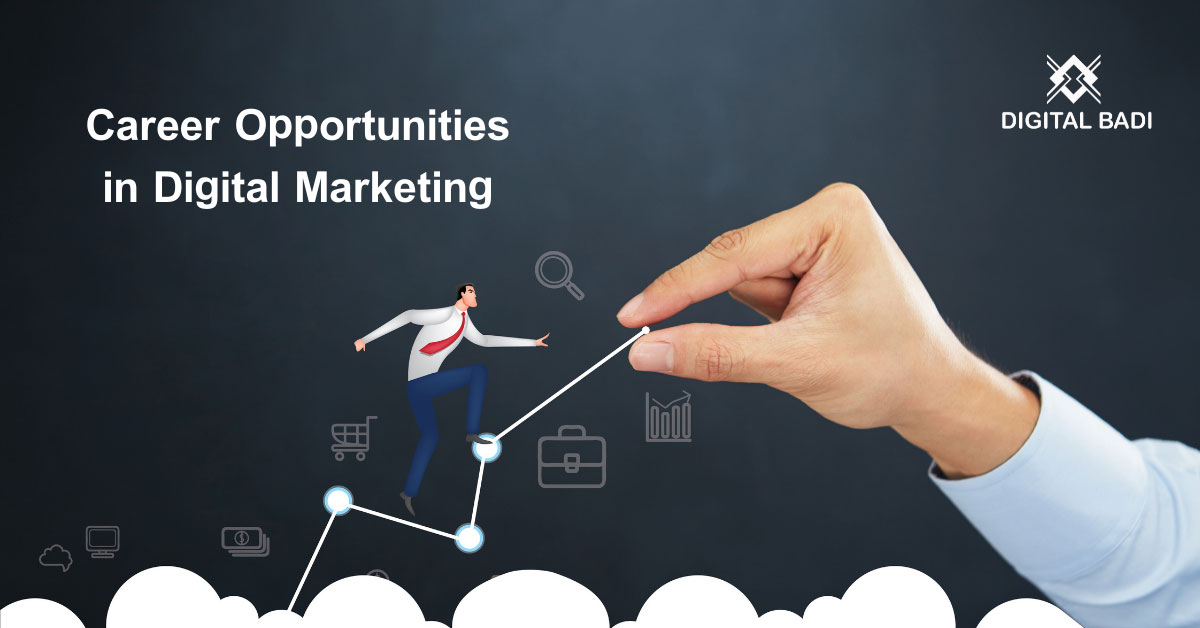
As the scope of digital marketing expands, so do the career opportunities in this field. Depending on the interests, skills, and experience, digital marketing professionals can pursue a variety of roles. Here are some popular career paths:
9.1 Digital Marketing Manager Scope of Digital Marketing
A digital marketing manager oversees all digital marketing efforts within an organization. This encompasses managing teams, setting goals, developing strategies, and analyzing campaign performance. The professional ensures that the business’s digital marketing activities are well-aligned with its overall objectives.
9.2 SEO Specialist
An SEO specialist is about improving a website’s ranking on search engines. They research keywords, check the on-page and off-page SEO, and track the performance of the website in the search engines, including Google.
9.3 Social Media Manager Scope of Digital Marketing
A social media manager is responsible for the creation, curation, and management of content across the platforms. They are also involved in the development of the campaigns, tracking engagement, and interacting with followers.
9.4 Content Strategist
Content strategist plans and develops content for the company with respect to its marketing goals. This includes making content calendars, writing blog posts, articles, and creating multimedia content that strikes a chord in the target audience.
9.5 Paid Media Specialist Scope of Digital Marketing
Paid media specialists are in charge of running and optimizing paid advertising campaigns on Google Ads, Facebook Ads, and Instagram Ads. They drive targeted traffic to websites through PPC or CPM campaigns.
9.6 Email Marketing Specialist
An email marketing specialist handles the design and maintenance of email campaigns that are in line with the nurturing of leads and relationships in customers. In this process, they concentrate on aspects such as personalization, segmentation, and automation to raise the effectiveness of email marketing.
9.7 Affiliate Marketing Manager Scope of Digital Marketing
An affiliate marketing manager handles the business affiliate program. This task entails affiliate recruitment, partner relationship management, and monitoring performance to ensure that affiliates generate the desired conversions.
10. How Digital Marketing Affects Business Growth
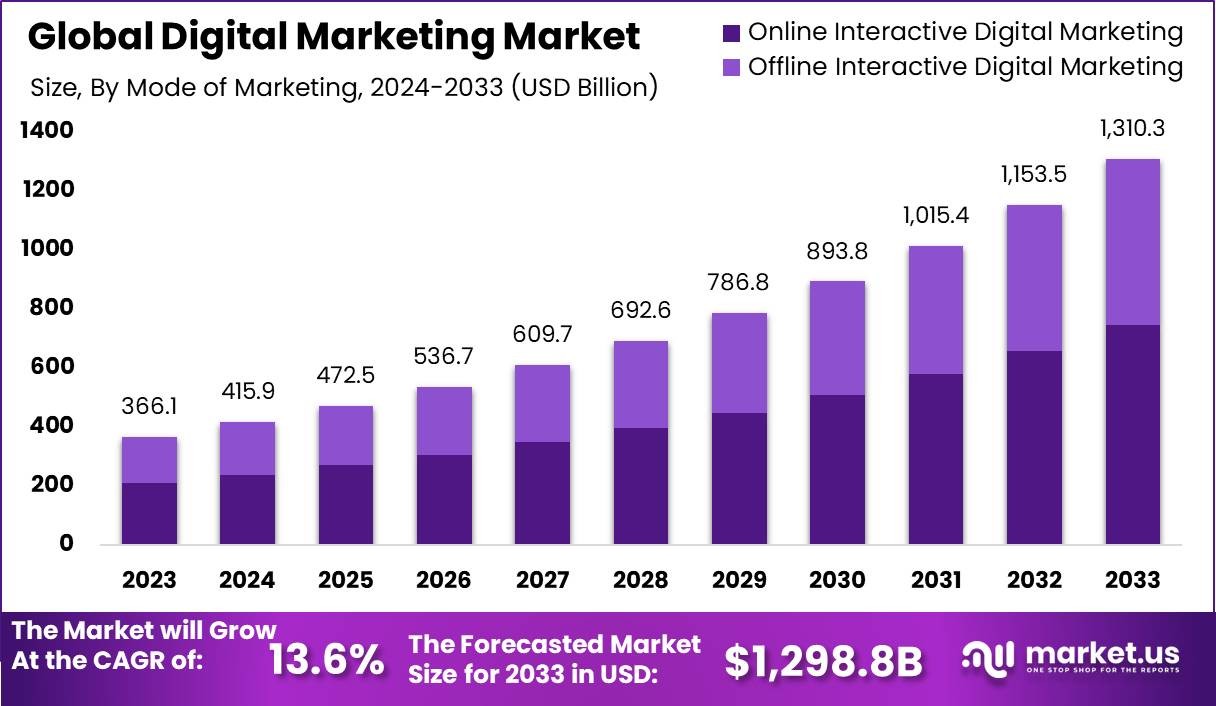
The extent of digital marketing is broad and, consequently, impacts the growth of a business straight away. Here’s how digital marketing leads to business success:
10.1 Increased Visibility
Digital marketing helps businesses reach a broader audience and improve their visibility online. Whether through organic search results, paid ads, or social media, digital marketing allows businesses to get in front of potential customers at the right time.
10.2 Enhanced Customer Engagement
Businesses can engage customers more effectively through personalized content, social media interactions, and email campaigns. Engaged customers are more likely to convert and become brand advocates, which leads to increased sales and brand loyalty.
10.3 Lead Generation and Conversion
It’s one of the most successful methods for generating leads in the areas of SEO, PPC, and email marketing. This helps target the correct audience with content and offers of value to attract the best possible leads to your website and get them converted to paying customers.
10.4 Cost Savings and Efficiency
Digital marketing offers better cost-saving and efficient usage of resources over traditional marketing. Data and analytics can help an organization maximize returns on the invested amount to reach the desired results, making each penny count as marketing money spends.
10.5 Competitive Advantage
As more businesses turn to digital marketing, companies that don’t adopt these strategies risk falling behind. Digital marketing provides a competitive advantage by allowing businesses to stay top-of-mind with customers and outpace competitors in terms of visibility, engagement, and brand loyalty.
11. Conclusion

Digital marketing is one of the areas that has grown dramatically over time and continues to grow. From SEO and content marketing to social media and influencer partnerships, digital marketing offers tremendous opportunities for businesses to reach out to audiences, drive conversions, and create long-lasting customer relationships. The growth and evolution of technology as well as consumer behavior will continue to make digital marketing very important in helping businesses succeed and remain important in modern times. Scope of Digital Marketing
Whether you’re a marketer looking to advance your career or a business owner seeking to harness the power of digital marketing, the potential for growth and success is limitless. By staying ahead of trends, mastering key digital marketing strategies, and embracing new technologies, businesses can ensure they remain competitive in a rapidly changing digital landscape.
Ultimately, digital marketing is not about just getting to consumers online but creating connections, getting value through these means and memorable experiences that really build their trust and loyalty.